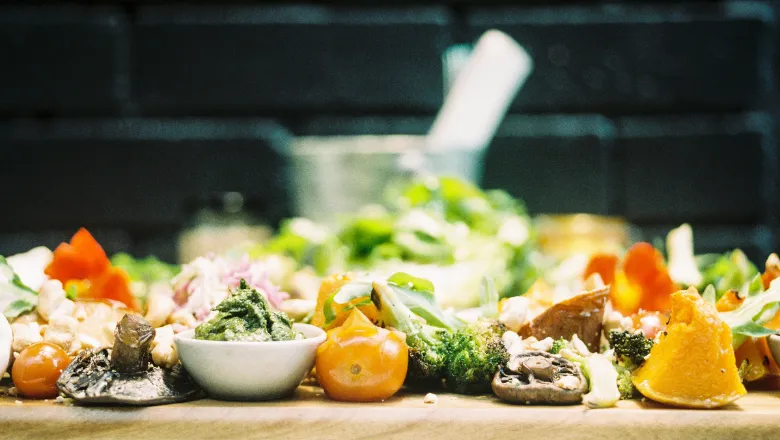Reducing our waste by creating an economy powered by nature is crucial for fighting climate change. We currently throw away billions of tonnes of perfectly usable organic waste every year but by using sustainable bio-converters we can transform this food waste into a valuable protein resource.
First author, Ellen Piercy
22 February 2023
Converting food waste to protein could help the global hunger crisis
Transforming food waste using sustainable technologies could produce enough protein to tackle the global food crisis.

Researchers from the Faculty of Natural, Mathematical & Engineering Sciences and the Faculty of Life Sciences & Medicine have found using just one of these processes to convert agricultural food waste could provide three times the amount of protein the average person needs to feed every person in the world, every day.
The paper, published in Green Chemistry, is the first time researchers have extensively reviewed sustainable technologies that convert organic waste, which includes food waste, from agriculture, kitchen and restaurants, and the food industry. The authors argue converting this waste into protein using these technologies could solve malnutrition, reduce the pressure on agriculture and food supply chains caused by the COVID-19 pandemic and fight climate change.
Recent disruption to global food supply chains has significantly increased the projected number of people suffering from malnutrition from 841 million to 909 million people by 2030. Yet 1.3bn tonnes of wasted food and 11.1 bn tonnes of crop residues such as wheat straw are being produced annually.
In the UK alone, 1.5 million tonnes of organic waste are created from the production of food, such as meat, diary, fruit and brewing products. New waste-to-protein technologies offer promising alternative protein sources that could increase food sustainability and security, whilst also addressing global malnutrition.
Fermentation is one technology which could make a difference. Arable farming produces 8 billion tonnes of carbohydrate waste every year, but if this waste could be fermented to make mycoprotein, this would produce the same amount of protein that could be had from 5 billion cows – three times more cows than there are on the planet right now.
This process is already used in the kitchen staple Quorn. Quorn converts carbohydrate (glucose from wheat) into protein to make mycroprotein using a specific fermentation process of a specific microbe, Fusarium venenatum.
By applying mycoprotein technologies to agricultural crop residues alone, 562 mega tonnes of protein could be produced annually. This represents potential waste-to-protein amounting to 197g/person/day, which would help meet the recommended average protein intake of 50g per 70kg adult per day.
Other technologies include employing insects to ingest food waste to grow and then subsequently harvesting them for human and animal consumption. These technologies are particularly efficient as they produce high level of proteins that are nutritionally viable.
While this news sounds promising, there are several barriers that prevent this number being achieved. Public perception of waste-to-protein processes and alternative proteins needs to change. Additionally, the hygienic quality and safety standards set by regulations vary significantly from country to country,
Organic waste derived from the food industry or agricultural sectors is a valuable resource. Waste can be recovered as high-value products such as proteins. Waste to protein technologies could offer promising protein alternatives to help alleviate the global hunger crisis. Our research suggests that beyond any individual technology, it is very important to synergistically integrate technologies and optimise the protein recovery from diverse waste streams. This paper represents a cross-disciplinary challenge which can only be tackled by joint efforts from scientists, engineers, working together with industry and governments.
Corresponding author Dr. Miao Guo, a Lecturer in Engineering
First author Peter Ellis from the School of Life Course & Population Sciences said: “Our paper is an excellent example of multidisciplinary research, and that this approach is crucial to addressing big scientific and technological challenges on a global scale. Having a large team of people with different expertise and perspectives has helped to kick-start this formidable challenge.’
Tim Finnigan, Chief Scientific Adviser of Quorn Foods, added: “Protein from waste – it’s a big idea, one that has the potential to revolutionise our food system, and something I have no doubt can be achieved with the right level of focus of investment. Exciting collaborative research is in place between Quorn and King’s College London on developing future mycoprotein to convert the carbohydrates found in arable waste (called lignocellulose) to protein. With the right focus, collaboration and investment a 5-year horizon seems realistic.”


